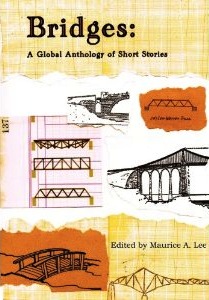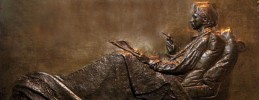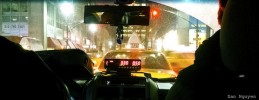
photo by Steve Austin-Russell
by Kirsty Walters
Opening Bridges is like opening a box of tricks with each story containing a new, magical insight into human nature and the bridges that connect us. Although each writer in the collection is unique in their writing style, they are united in their beautiful use of language and observation – scrutinizing the way in which we as humans interact with one another and with the world around us.
The writers come from over fifteen different countries, providing a refreshing range in both the content of the stories and narrative voices. In the publisher’s note it is mentioned that the translations of some of the stories into English, from the writers’ mother tongues, proved to be a challenge. There was a concern about ‘the readers and their ability to both understand and accept paragraph structures and sentences which, although written in English, were not in patterns of which they were familiar.’ Although I did find some of these translated stories perhaps harder to read at times, I think that the stories held in their slightly disjointed structures a touching truth, and only made me appreciate the work that went into this collection all the more.
 This collection provides such a wide range in subject matter and narrators, and yet in their diversity nearly all of them have touched me or stayed with me long after having closed the last page. One particularly poignant story, ‘The Hurricane’, was contributed to the collection by American writer Hope Coulter. It tells the story of a couple who have been trying to conceive a child and are about to embark on their annual holiday. The night before they are due to leave, they find out that a storm is about to hit their destination. But, eager that his neurosurgeon wife have some time to relax and become herself again, George is keen that they still go. However, when they arrive at their house on the beach, the storm is upgraded to a hurricane. They are advised to leave after only one day on their holiday and dutifully pack up their things and jump in the car. Whilst Jill checks up on family, George is left reflecting on their lives, thinking:
This collection provides such a wide range in subject matter and narrators, and yet in their diversity nearly all of them have touched me or stayed with me long after having closed the last page. One particularly poignant story, ‘The Hurricane’, was contributed to the collection by American writer Hope Coulter. It tells the story of a couple who have been trying to conceive a child and are about to embark on their annual holiday. The night before they are due to leave, they find out that a storm is about to hit their destination. But, eager that his neurosurgeon wife have some time to relax and become herself again, George is keen that they still go. However, when they arrive at their house on the beach, the storm is upgraded to a hurricane. They are advised to leave after only one day on their holiday and dutifully pack up their things and jump in the car. Whilst Jill checks up on family, George is left reflecting on their lives, thinking:
In a minute Jill would hang up and come this way. Maybe she
was about to say that her sister and brother-in-law were dead,
and that the will would name her and George as custodian of
the four children. He was fated, then, to accumulate kiddie
tapes in his car and Lucky Charms in his cupboard, to spend
weekends at soccer fields and pizza arcades, and to watch over
and over again with hammering heart while slight, short figures
who were dear to him climbed into cars and rode away.
Or maybe, as Jill crossed the parking lot, he would realize that
he had known for a long time, deep inside, that the marriage
was over.
This touching moment portrays one of those heart-wrenching realisations that one hopes they will never reach in their own lives. George goes on to imagine their lives after their separation, mirroring the way in which I think everyone, at one time in their relationship, wonders how their life would play out if their other half was no longer in the picture.
A slightly more playful and yet painfully honest story, is ‘Nocturne’ by S. K. Chang. It tells the story of a woman, Pei Hua, locked in a struggle with her mother who wants her to find a suitable husband and settle down. After a dinner party Pei Hua jumps into a cab with a driver who gives her a strange device called a Chronobot, which will allow her to fast forward or slow time down. The driver’s only stipulation is that in one year she must return the Chronobot to him and whatever time she has saved up she must give to him. Pei Hua agrees to his terms and takes the device home where she finds herself fast forwarding through time like ‘an opium addict’. She muses that ‘the hardest thing in life for a person was to be lonely, but with a Chronobot, she no longer feared being alone.’ A sad thought for a young woman to be wishing her life away so that she will not feel the sting of loneliness. When she meets up with the cab driver a year on, she has saved up more than two months’ worth of time. It transpires that the driver has been collecting these saved hours from hundreds of people, hoping to save up ten thousand years so that he can visit every corner of the world and read every book, so that he might find the answer to the riddle of life. Pei Hua asks to go with him, but he refuses and says instead that he will meet her in four days’ time to tell her what he has learnt. Pei Hua is left ‘filled with longing…waiting for a driver who loves Haydn to return exhausted from his journey.’ This story calls to mind the saying ‘to wish your life away’ and reminds me that there are far more worthwhile pursuits than to wish for its quick passing.
Almost every story in this collection leaves a lasting impression, as they draw on raw human emotions. ‘This Didn’t Happen to You’, by Molly McClosky, deals with a relationship between two people after one of them receives some bad news, leaving the narrator ‘feeling like a dream she had’. In ‘Telling’, by Irishman William Wall, we see the inappropriate goings on in a Catholic boarding school where ‘you knew from the beginning that there was no telling’. Nuala Ní Chonchúir’s ‘When the Hearse Goes By’ is about a man’s meeting with his sister-in-law after his brother’s death. And ‘Leaving Taiwan Alcatraz’ by Ciao Li, tells of a man locked unjustly away in a Taiwanese prison.
This is one of the most diverse and touching collections I have ever read – it would be hard, I think, for anyone to get through Bridges without being moved by at least one of the stories. Or without feeling a moment of personal truth.

